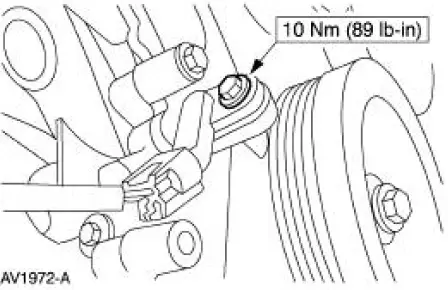Ford Mustang (1999-2004) Service Manual: Crankshaft Position (CKP) Sensor - 4.6L
Removal
1. Disconnect the battery ground cable. For additional information, refer to Section.
2. Remove the A/C compressor. For additional information, refer to Section.
3. Remove the crankshaft position (CKP) sensor.
- Disconnect the connector.
- Remove the bolt and remove the sensor.

Installation
1. To install, reverse the removal procedure.
 Crankshaft Position (CKP) Sensor - 3.8L
Crankshaft Position (CKP) Sensor - 3.8L
Removal
1. Disconnect the battery ground cable. For additional information,
refer to Section.
2. Remove the crankshaft position (CKP) sensor.
Disconnect the connector.
Remove the bolt ...
 Powertrain Control Module (PCM)
Powertrain Control Module (PCM)
Removal
1. Disconnect the battery ground cable. For additional information,
refer to Section.
2. Remove the RH front door scuff plate.
3. Remove the RH cowl side trim panel.
Remove the ...
Other materials:
Power Steering (Description and Operation)
System View
Steering System Components - 3.8L Engine
Steering System Components - 4.6L Engine
Steering Gear Mounting
Steering Gear
Power Steering Pump - CII
Power Steering Pump - CIII
Power Steering Gear Identific ...
Engine Front Cover
Material
Item
Specification
Metal Surface Cleaner
F4AZ-19A536-RA or equivalent
WSE-M5B392-
A
Silicone Gasket and Sealant
F7AZ-19554-EA or equivalent
WSE-M4G323-
A4
SAE 5W-30 Premium Synthetic
Blend Motor Oil
XO-5W30-QSP ...
Shift Patterns
Upshifts
Transmission upshifting is controlled by the powertrain control
module (PCM). The PCM receives
inputs from various engine or vehicle sensors and driver demands to
control shift scheduling, shift feel
and torque converter clutch (TCC) opera ...
